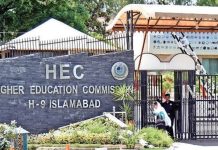By Ali Imran
ISLAMABAD: The Sustainable Development Policy Institute (SDPI) launched Pakistan’s Industrial Decarbonization Program (PIDP) during the Policy Dialogue on Just Energy Transition in Pakistan that was conducted under the auspice of SDPI’s Network for Clean Energy Transition (NCET).
This significant dialogue brought together key stakeholders, including diplomatic missions, development partners, and public sector institutions, to discuss and collaborate on decarbonization drive in the industrial sector.
This initiative aims to significantly reduce carbon emissions in Pakistan’s industrial sector by leveraging the expertise and resources of multiple partners.
Key industries targeted for decarbonization in the initial phase include cement, steel, and textiles, with a focus on harnessing green financing opportunities, developing business case for the industries and implementing best practices from around the world, particularly to align it with the European Union’s Cross Border Adjustment Mechanism (CBAM).
Executive Director, SDPI, Dr Abid Qaiyum Suleri emphasized the challenge of transitioning from fossil fuels to renewable energy, especially for developing countries like Pakistan.
He highlighted the need for international support in technology and financing, given Pakistan’s minimal contribution to global warming. Dr. Suleri while pitching a case for Just Energy Transition Partnerships cited successful examples from South Africa and Indonesia, urging similar support for Pakistan to ensure a just energy transition. The dialogue aimed to gather recommendations for key development partners and G7 diplomats, to be discussed at COP29 in Baku.
Managing Director, National Energy Efficiency and Conservation Authority (NEECA), Dr. Sardar Mohazzam stressed the importance of a diversified energy portfolio for ensuring energy security and highlighted the shift towards renewables. He raised concerns about addressing the circular debt issue and emphasized the need for a just transition in the energy sector, particularly in terms of financing mechanisms.
Research Associate and Lead of the Decarbonization Program at SDPI, Saleha Qureshi presented the decarbonization program to stakeholders.
She mentioned that the Pakistan Industrial Decarbonization program aims to achieve global goals through collaboration, research, capacity building, and policy development, involving key stakeholders from the public and private sectors, CSOs, and international organizations.
The key industries under this initiative will cover cement, steel, and textiles in the first phase, with themes covering zero-energy power fuels, trade policies, and GHG accounting for the industry.
Sobiah Becker Advisor, (GIZ) the urgent need for a transition to renewables, stressing the economic case for increased investments in renewable energy sources like green hydrogen in the industrial sector. She highlighted the potential for substantial savings in manufacturing green hydrogen in Baluchistan compared to Europe.
Deputy Executive Director (DED), SDPI, Shafqat Munir mentioned that under this initiative SDPI will be engaging with all key stakeholders for providing the private sector with alternate economic engines to make a business case.
Dr. Munir invited the stakeholders to engage with SDPI in joint efforts for energy and climate action of Pakistan. While discussing the prospects of Just energy transition, he highlighted the need for a paradigm shift in energy discussions, emphasizing the importance of unlearning and relearning perspectives on just transitions.
He criticized the colonial mindset prevalent in energy discourse and urged for a decolonized approach at the domestic level. Munir emphasized the lack of structured solutions and called for a politic economy approach, stressing the necessity for policies rooted in the ownership and welfare of the people.
Research Fellow at SDPI, Dr. Khalid Waleed presented a Just Energy Transition Partnership (JETP) model for Pakistan. He highlighted that through this model, Pakistan can mobilize the necessary finance to enable its clean energy transition.
Dr. Waleed further explained how a JETP model for Pakistan can generate funding for the early retirement of coal powerplants and mobilizing the investments for renewable energy development in the country.



